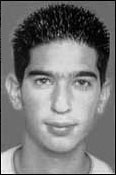|
|
Asel
Asleh, a 17year old Arab, was buried in his green shirt.
He owned 30 of them, all with
the same logo, the words “Seeds of Peace”
and an olive branch. He had spent three summers in the
woods of Maine at a camp run by Seeds of Peace, a U.S.-based
group that tries to foster co-existence and has brought
some 1,300 Arab and Jewish teen-agers together.
|
There,
the teen-ager from Arabeh struck up friendships with
Israeli Jews, including 17-year-old Moran Eisenbaum,
who paid a condolence visit to Asleh's family Wednesday,
along with others from the local Seeds of Peace chapter.
After
returning from summer camp, he nurtured his new friendships.
His parents would drive him to friends'
|
homes
in Jerusalem and Tel Aviv on the weekends for visits.
He invited them home for Muslim holidays. He hoped to
become a computer engineer and spent much of his time
e-mailing his camp friends.
Asleh
was killed by Israeli police fire during stone-throwing
clashes in his home village of Arabeh, in northern Israel.His
relatives weren't sure if he
|
was
among the stone-throwers or just stumbled into the line
of fire while trying to reach a fatally wounded friend.
At one point, Asleh's mother, Wajeeha, sensing the danger,
ran along the rocky hillside to warn her son and urge
him to come home, but couldn't reach him in time, said
Asleh's sister, Nardeen.
|
Soon
after, hundreds of Arabeh residents took to the streets
to vent their anger. Many threw rocks. Israeli police
fired rubber bullets, chased demonstrators with clubs
through olive groves and also fired live ammunition.
|
In
an essay he wrote for the Seeds of Peace newsletter, Asleh
had expressed his double identity: " I can never take
the word Israeli off my passport, or the word Arab, which
I feel proud of every time I hear it,'' he wrote. ``We
can't change what we are but we can change the way that
we live already, we can take our lives in our hands once
again.'' |
Ned
Lazarous, the program director at the Seeds of Peace
center in Jerusalem, recalled an evening spent at the
Asleh home during the Muslim holiday of Eid el-Fitr
last year. Asleh and several of his Jewish mates from
camp were gathered around a table for a festive meal.
|
``It
was a wonderful evening ... one of those moments when
you felt that this (peace education) is working,'' said
Lazarous. `But now, moments like this feel like the hatred
and lack of control of people is destroying all the trust
that beautiful moments like that build.'' |
 |
Ofir
Rahum was 16,
Amneh Muna was 25.
He was an Israeli and she a Palestinian.
He lived in Ashkelon and she in Ramallah.
He had green eyes, white skin and black hair.
She had hazel eyes and black hair cut in a bob.
He had just learned to shave
a few weeks earlier. |
They
met on an Internet chatroom.
Amneh told Ofir that her name was Sali
that she was a recent Moroccan
immigrant, she
did not speak Hebrew very well yet.
He
wanted a date so much, they set one up
for Wednesday, January 17.
|
"
I hope you are coming on Wednesday..
please don’t say no I need you to be with me..please"
"Sali" wrote
"I will be waiting for you.
I prepare my friends house to stay there"
"Sali" wrote
|
On
Tuesday Ofir told his friends:
"If I’m not in school
tomorrow, be happy for me."
He left at seven as usual
With his red backpack,
He had gel in his hair.
Ofir never came back.
|
Amneh
Munah did not want to love
but to avenge the 400 Palestinians killed
in the recent riots. She was active in Fatah.
Ofir’s
body was found, riddled with bullets,
In a shallow grave near Ramallah.
Her friend Hassan al-Qadi did it with a Kalachnikov.
He was only supposed to abduct Ofir, she said.
|
In
the photograph taken at the police station, Amneh Muna
Is smiling behind her cuffed hands.
I am very happy Ofir that you will come
"Sali" had written
"I miss you"
"Sali" had written
"Will you come by
bus or by taxi?"
|
"I
will have a
good dream about you"
"Sali" had written
Words
have killed
Before
bullets did.
|
|